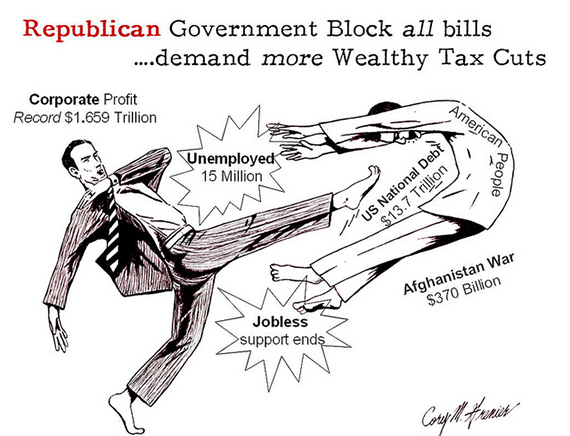
It’s almost always about choice. It depends, of course, on who makes the choice. Power is primary when we talk about the ability to choose. Powerful governments enjoy a range of options, and also have the means to deceive their citizenry as to where the responsibility for their choices lay. We’ve all been privy to public service announcements and commercial advertisements urging us to spend money we don’t have in order to save an economy being squandered by our elected officials and the corporations that increasingly pull their puppet strings. During the 1960s and ‘70s we often said we wished the military had to hold a bake sale to fund its B-52s and that ordinary people might have access to government funding for projects as worthy as peace and education.
I, for one, am tired of being told it is up to me to conserve energy when huge corporations continue their fracking and other dangerous practices, stop watering my garden when developers deplete our water table, or be courteous to others when my leaders wage unending war. Of course I do these things, because I believe they are important. But I would like our elected leaders to make the same choices.
Well-educated wealthy individuals with many options have a hard time empathizing with people struggling to get a job, remain in their homes, feed their families, or gain access to minimal healthcare or subsistence services. That’s why we frequently hear diatribes from the obscenely privileged about the “laziness” of welfare recipients or irresponsibility of teenage mothers. Those who have it all are incapable of walking in the shoes of those whose wellbeing they’ve stolen.
In an opinion piece by Joseph E. Stiglitz that recently appeared in The New York Times, the economist points out how “income and wealth inequalities in most rich countries, especially the United States, have soared in recent decades and, tragically, worsened even more since the Great Recession.” Stiglitz wants to know if this gap also shows up between nations, developing as well as developed. It is no surprise that the trend, led by the US, has been toward greater and greater inequality—both between the haves and have-nots in a single country and between the rich countries and the poor.
What may be surprising is that this trend in not inevitable, even in early 21st century capitalism. Since the 1980s, income inequality has grown even in traditionally egalitarian countries such as Germany, Sweden and Denmark. With a few exceptions, the top 10 percent of earners in most of the advanced nations moved up in status while the bottom 10 percent fell further and further behind. But this trend has been neither universal nor inevitable.
In this same period, Stiglitz tells us, countries such as Chile, Mexico, Greece, Turkey and Hungary, managed to reduce income inequality significantly. This suggests that inequality or its eradication is not simply a product of macroeconomic forces, but responds to political will. Sadly, globalized markets can impede or halt this sort of humane progress. But if making life better for the majority of a country’s citizens is important to those in power, they will make choices that bring this about.
We know that the 1% at the top of our economic ladder now take home almost a quarter of the nation’s income. In recent times this reality was popularized on the one hand by the obscenities made by Mitt Romney and recorded without his knowledge during the 2012 presidential campaign; and on the other by the Occupy Movement, that did so much to create a popular awareness of income inequality.
What remains more hidden is the degree to which the Kochs and Ryans and Cruzes continue to broaden the gap. The Great Recession wiped out hundreds of thousands of jobs that will not be coming back. The overall economy may improve, but it will do so with robots and by forcing those who manage to find work to labor longer for less pay. A new normal was created.
Then came another new normal called the Sequester. Advertised as a temporary measure, it has been solidified in the offers the Republicans have put on the table as they pretend to be engaged in honest give and take around the debt ceiling.
The current governmental shutdown constitutes yet another new normal. Under the guise of balancing the budget, the Right hopes to definitively cut what it refers to as entitlements. These include Social Security, Medicare, Medicaid, Food Stamps, Head Start, healthcare for the most vulnerable among us, attention to the mentally ill, public education, and funding for national parks and public spaces that provide a livelihood for hundreds of thousands of working people and keep many small cities and towns alive. (In the past few days a number of states have taken on the responsibility of reopening their national parks in order to keep visitor dollars coming in. Will this become another new normal?)
There always seems to be enough money to fund our wars, the vast collection of personal data made in the name of national security, and other illegal programs involving prisons where torture is routine and people have been held for years without access to a trial or functional legal council. These are exempt from the new normal, and they are exempt not due to any systemic requirement but because of the choices being made in our names.
Steiglitz points out that shared prosperity is the only sort of prosperity that is sustainable, not only morally but economically as well. At the moment, our elected officials are either making the wrong choices or pandering to those who do. If we continue to choose them, all of them, we too are making the wrong choices. Our choices will determine whether or not we have a future that serves our interests and those of the earth itself, or whether we will be reduced to enclaves of tightly gated communities and vast gutters of expendable humanity.
(Photo by Cory M. Grenier)

October 15, 2013